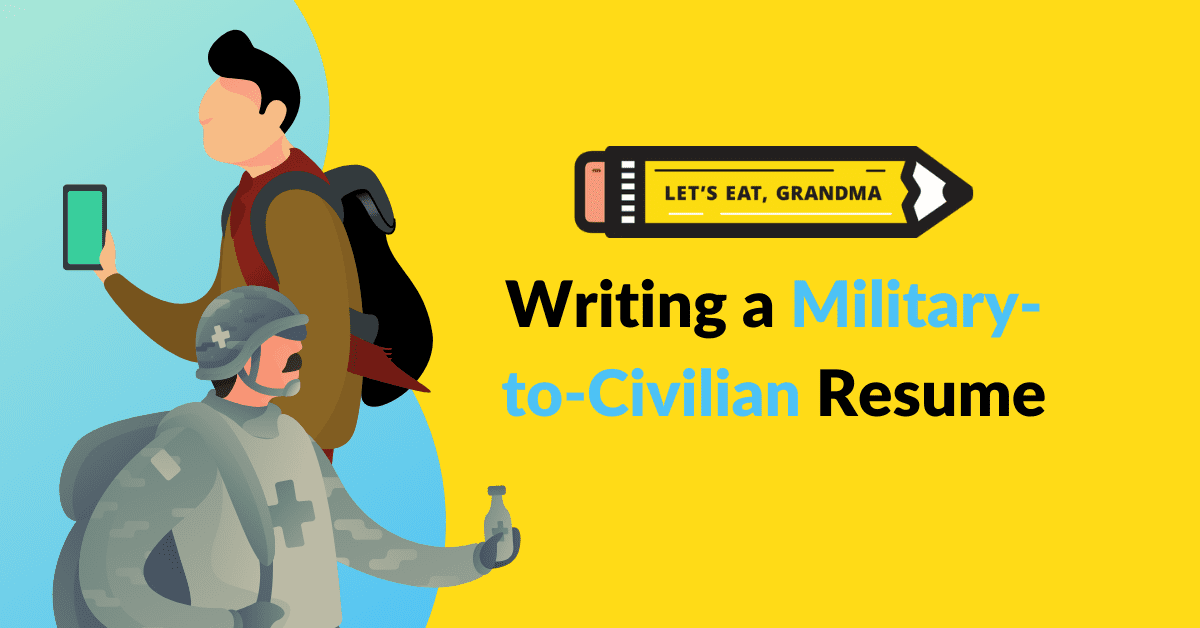How to Write a 5-Star Military-to-Civilian Resume

When you prepare for separation and transition from the military, there’s a lot to consider — and it all starts with finding a civilian job. Read on to get a jump start on creating a 5-star military-to-civilian resume.
By: Ashley Dolar | Contributor for Let’s Eat, Grandma
Are you ready to transition from the military to a civilian position? When my husband separated from active duty and entered the U.S. Army Reserve, we didn’t know what to expect in the wild west of full-time, non-military employment. He went straight from college to military service and never needed a resume!
If you find yourself in the same boat (or another military-related situation), you will probably need to create a resume from scratch. It’s important to get this step right because an excellent resume sets you apart from the competition — which is how you land a job interview. Here are four ways to get your military-to-civilian resume noticed by employers:
Tired of not landing interviews?
Get our free 3-step guide to writing better resume bullet points, featuring 70 ideas for metrics you can use!
Writing a Military-to-Civilian Resume: Learn to Speak Civilian

When transitioning from the military to a civilian career, your first step will be to craft a resume that showcases your transferable skills. Photo by The Creative Exchange on Unsplash
When you first joined the military, you needed to learn an alphabet soup of acronyms. Now it’s time to unlearn them for the purposes of writing a civilian-friendly resume. Most hiring managers and ATS software aren’t going to recognize military jargon, so it’s best to avoid it.
Instead, focus on your strengths and transferable skills. Chances are you were involved in some type of leadership, change management, process improvement, government compliance, budget administration, and/or teamwork. These are valuable skills in both the military and civilian workforce, yet they may have been called something different depending on your branch of service.
You probably need to do a little translation work, but it will be worth it. We suggest enlisting a non-military friend to help you work through any technical phrasing to make sure it’s ready for civilian eyes.
One more quick tip: You should list the place of your intended relocation – not your current duty station – in your contact information. This is important for both hiring managers and ATS purposes. (Find a quick rundown of ATS keywords for recruiter searches here!)
Detail Your Summary of Qualifications

A strong Summary of Qualifications section will communicate the value of your military experience to a prospective employer. Photo by Jessica Radanavong on Unsplash
Your military experience is valuable to employers across the country, and you can still be the perfect candidate without prior civilian experience. The key is to build your credibility and show that you can do the job.
The first piece of the puzzle is to build a strong Summary of Qualifications section. This section takes the place of the outdated Objective Statement, and it has the power to make a huge impact on your job search. In this case, it’s meant to communicate your unique value-add to a potential employer while also explaining your desire to transition from a military career to a civilian career.
So, how do you write an eye-catching summary?
Your first step is to do some reflection and research to find an industry that interests you and matches your qualifications. You’ll want to tailor your resume in that direction using keywords from each job description you apply to.
Then, once you’ve settled on a few potential jobs, think about the experience and skills that you bring to an organization. Consider your military background, volunteer work, specific training courses, honors, awards, and education.
If the job is looking for a skilled problem solver or an experienced IT manager, you should say you are exactly that — as long as you can back it up with evidence at some point in your resume.
Here’s an example of a military-to-civilian resume summary section:
Right away, you can see this service member has eight years of experience in the military, with a focus on leadership, project management, and communication. Now the rest of the resume just needs to prove it.
Highlight Career Achievements
It’s time to dig deep for the Professional Experience portion of your resume. This is where you write accomplishment-based bullet points — not day-to-day job duties — to really show a potential employer what you can do for their company.
Get started by thinking about your involvement in key projects and programs for each of your positions in the military. In other words, how did you help fulfill the mission or meet the objective? You may want to pull out those old service branch evaluations to help you remember exactly what you accomplished over your military career.
Then, try brainstorming on these topics:
- People you managed, mentored, and developed
- Equipment you inventoried and distributed
- Technology you set up, improved, and/or scaled
- Time you saved with a process improvement
- Problems you identified and solved for your team
- Ideas you pitched, developed, and rolled out
- Systems you created, organized, or optimized
- Change management initiatives you implemented
Remember to include metrics whenever possible! Numbers make you real by providing hiring managers with important context, a sense of scale, and the amount of impact. (You can find 70 ideas for metrics in our free eBook!)
Leverage Your LinkedIn
Lastly, your LinkedIn profile is just as important as a traditional resume. It’s a place to build connections with colleagues and network with potential employers. Recruiters often look for talent on the platform, too, so you’ll definitely want to set up a profile if you haven’t already.
As a bonus, LinkedIn offers U.S. service members a one-year subscription to its Premium service for free! That includes LinkedIn Learning and other perks. Military spouses can also take advantage of this free resource. (Read more on LinkedIn Premium here.)
Ready for more job search help?
Sign up for a free Senior Writer Resume Critique to see what's holding you back from landing interviews. One of our top professional resume writers will give you personalized feedback on the top 3 items you can improve based on our expert practices!

